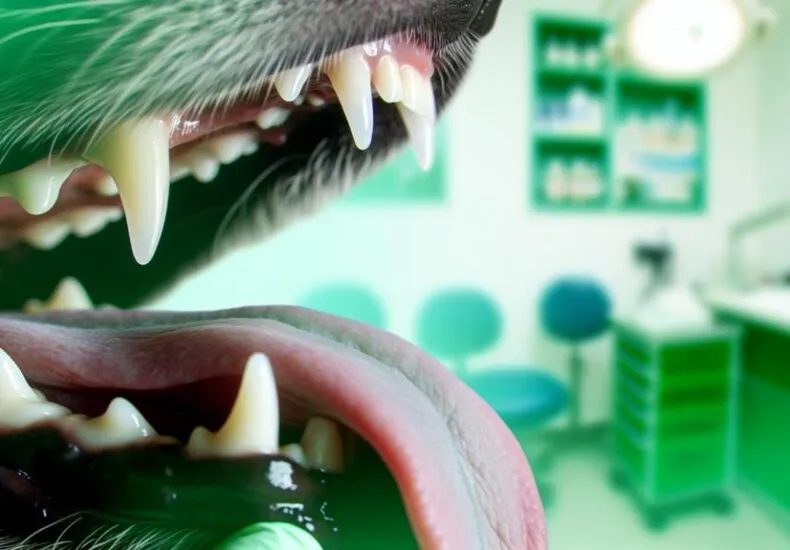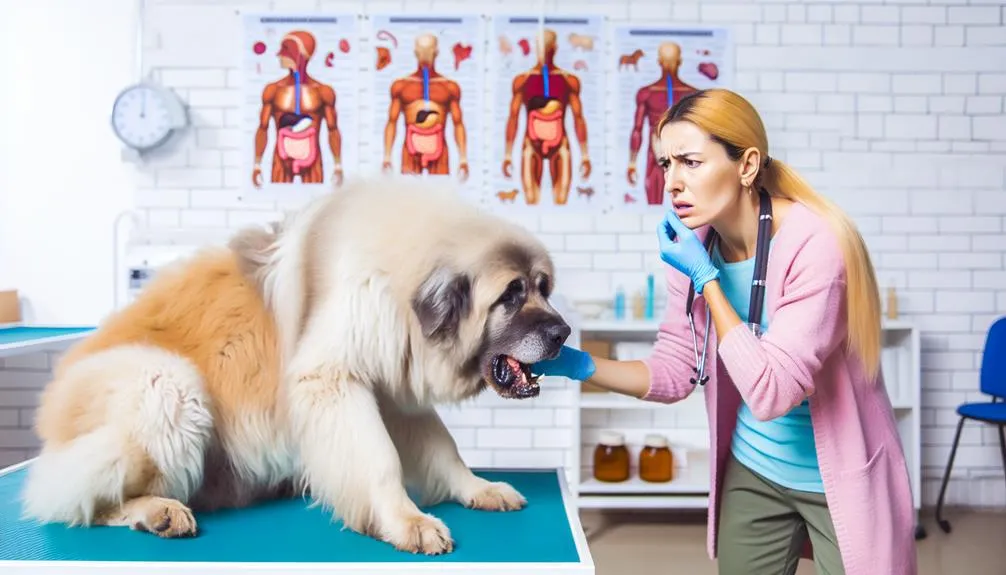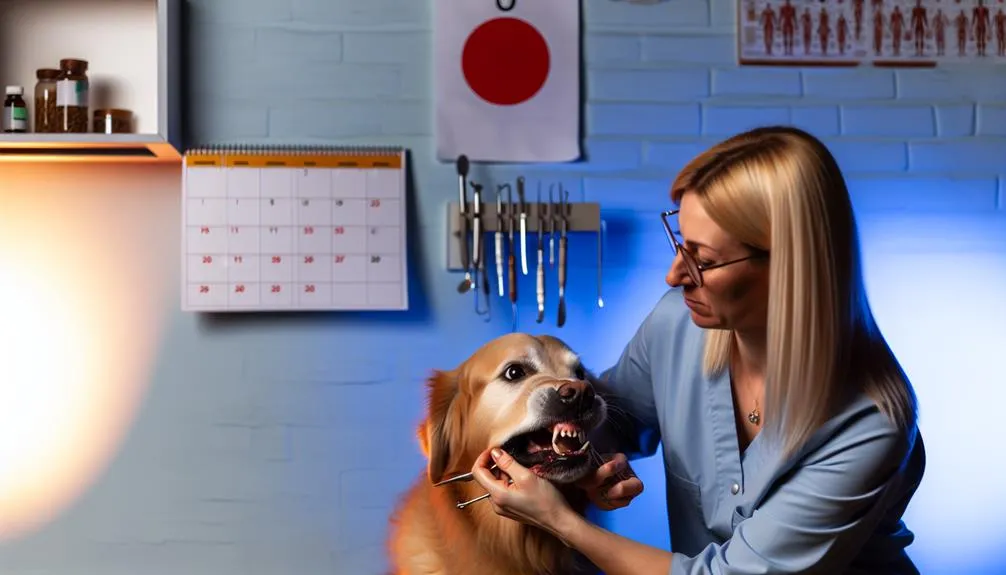
Is Bad Breath in Dogs a Sign of Illness
It's a coincidence that you just noticed your dog's breath smells off, as many pet owners often overlook this seemingly trivial detail. While you might chalk it up to a recent treat or just typical doggy odor, bad breath can sometimes indicate more serious health issues lurking beneath the surface. From dental decay to systemic diseases, the implications can be significant. So, what should you consider if you find yourself in this situation? Understanding the potential causes can provide essential insights into your dog's overall health and well-being.
Common Causes of Bad Breath
Bad breath in dogs can stem from a variety of underlying issues, often indicating more than just a need for a dental cleaning. One common cause is poor oral hygiene, which can lead to the buildup of plaque and tartar on your dog's teeth. If you haven't been keeping up with regular brushing and dental care, bacteria can thrive, resulting in foul odors. You might want to contemplate incorporating dental chews or professional cleanings to combat this.
Dietary factors also play a significant role in your dog's breath. Certain foods, particularly those high in sugars and fillers, can contribute to bad breath. If you're feeding your dog low-quality kibble or table scraps, it could be time to reassess their diet. Opting for high-quality, balanced dog food can not only improve their overall health but also positively impact their oral hygiene and breath.
In addition to these factors, underlying health issues like gastrointestinal problems or infections can contribute to bad breath. If you notice a sudden change in your dog's breath or if it's accompanied by other symptoms like vomiting or lethargy, it's vital to consult your veterinarian. They can help identify any serious issues that may be lurking beneath the surface. By addressing both oral hygiene and dietary factors, you can help guarantee that your dog maintains fresh breath and good health.
Dental Issues to Consider
When it comes to your dog's dental health, a range of issues can contribute to persistent bad breath. Ignoring these problems can lead to more severe health concerns, so it is important to stay vigilant. Here are three dental issues to take into account:
- Periodontal Disease: This common condition occurs when plaque builds up, leading to inflammation and infection in the gums. If left untreated, it can result in tooth loss and may even impact your dog's overall health.
- Dental Decay: Just like humans, dogs can suffer from cavities and tooth decay. Poor dental hygiene allows bacteria to thrive, leading to pain and discomfort, which can affect your dog's mood and behavior.
- Tartar Buildup: Hard deposits form when plaque isn't removed through regular brushing. Tartar can harbor bacteria that contribute to bad breath and exacerbate periodontal disease, making it important to maintain your dog's dental hygiene.
Regular dental care is essential to your dog's well-being. Brushing their teeth, providing dental chews, and scheduling professional cleanings can help prevent these issues. By prioritizing their dental hygiene, you're not just fighting bad breath; you're safeguarding your dog's health. Don't hesitate to consult your veterinarian if you notice any signs of dental problems. Your furry friend deserves a healthy mouth and a happy life!
Gastrointestinal Problems

Gastrointestinal problems can greatly contribute to your dog's bad breath, often indicating underlying health issues that need attention. If your pup's breath smells foul, it might be a sign of poor dog digestion. The digestive system plays an essential role in maintaining overall health, and any disruption can lead to unpleasant odors.
One common issue is an imbalance in stomach bacteria. A healthy gut flora is important for breaking down food and absorbing nutrients. When the balance is off, it can result in excessive gas production and fermentation, leading to a stinky breath. Conditions such as gastroenteritis, inflammatory bowel disease, or even food intolerances can exacerbate this imbalance, causing not only bad breath but also symptoms like vomiting, diarrhea, or decreased appetite.
If you notice persistent bad breath in your dog, it's important to evaluate their diet and feeding habits. Low-quality dog food or sudden dietary changes can upset their digestive system, contributing to odor issues. You should also pay attention to any additional signs of gastrointestinal distress.
Other Health Concerns
Often overlooked, other health concerns can also lead to bad breath in dogs. While oral hygiene and diet impact are significant contributors, there are deeper issues at play that you should be aware of. Bad breath can signal potential health problems that may require your attention. Here are three essential concerns that might be affecting your pup:
- Kidney Disease: Dogs with kidney issues may develop a distinctive ammonia-like breath. This can indicate a serious condition that needs immediate veterinary attention.
- Diabetes: Sweet or fruity-smelling breath can be a sign of diabetes mellitus. This metabolic disorder can lead to severe health complications if left untreated.
- Liver Disease: An unusual metallic scent could suggest liver problems. The liver plays a fundamental role in detoxifying the blood, and any malfunction can have significant health repercussions.
It's important to take into account how your dog's oral hygiene and diet impact their overall health. Regular dental care helps prevent periodontal disease, which can worsen bad breath and lead to systemic health issues. Plus, a balanced diet can promote better dental health, reducing plaque buildup and the risk of infections.
If you notice persistent bad breath accompanied by other symptoms, it's essential to assess these potential health concerns. Paying attention to these signs can make a significant difference in your dog's health and well-being. Remember, your furry friend relies on you to keep them happy and healthy.
When to See a Veterinarian

Recognizing the signs of bad breath in your dog is important, especially if it's coupled with other symptoms that may indicate underlying health issues. If your dog's breath suddenly worsens, or if you notice any of the following symptoms—like drooling, difficulty eating, swollen gums, or changes in behavior—it's time to see a veterinarian. These signs can signal dental disease, which not only affects oral hygiene but may also lead to more serious health concerns.
Preventive care is essential in maintaining your dog's overall well-being. Regular veterinary check-ups should include oral evaluations to catch any dental issues early. If you've been diligent about your dog's oral hygiene but still notice persistent bad breath, don't hesitate to seek professional advice. Your vet can perform a thorough examination and may recommend dental cleanings or treatments tailored to your dog's needs.
Additionally, if your dog exhibits signs of systemic illness, like vomiting, weight loss, or lethargy, these could be red flags that require immediate attention. Bad breath, in this instance, could be a symptom of a more significant health issue, such as kidney disease or diabetes.
Frequently Asked Questions
Can Diet Affect My Dog's Breath Odor?
Yes, your dog's diet can greatly affect their breath odor. A balanced diet promotes fresh breath and supports dental hygiene. Regular dental care, alongside proper nutrition, helps maintain your dog's overall health and well-being.
Are Certain Dog Breeds More Prone to Bad Breath?
Certain breeds, like small dogs, can be prone to bad breath, similar to how some cars need more maintenance. Their dental hygiene often suffers from bacterial buildup, making regular care essential for fresh breath and health.
Does Age Influence the Likelihood of Bad Breath in Dogs?
As dogs age, their dental hygiene often declines, increasing the likelihood of bad breath. During puppy development, establishing good dental care habits can greatly reduce future issues, promoting healthier mouths and fresher breath throughout their lives.
Can Bad Breath Be Linked to Dog Anxiety or Stress?
Bad breath's like a stormy cloud, often linked to dog anxiety or stress. Just as stress effects can manifest in humans, your dog's oral health might reflect emotional turmoil, warranting attention and care to improve their well-being.
Are There Home Remedies for Dog Bad Breath?
You can use natural remedies like coconut oil or parsley to improve your dog's breath. However, maintaining proper dental hygiene through regular brushing and vet check-ups is essential for long-term oral health and freshness.
Conclusion
If your dog's breath suddenly turns foul, it's not just a nuisance—it could be a cry for help from their body. Don't ignore the signs; underlying health issues might be lurking, waiting to escalate. The clock is ticking, and your furry friend depends on you to act. A simple vet visit could uncover hidden problems, ensuring your dog's health and happiness. Remember, you hold the key to their well-being—don't let bad breath be a silent alarm.
You may also like
Archives
Calendar
| M | T | W | T | F | S | S |
|---|---|---|---|---|---|---|
| 1 | 2 | 3 | 4 | 5 | 6 | |
| 7 | 8 | 9 | 10 | 11 | 12 | 13 |
| 14 | 15 | 16 | 17 | 18 | 19 | 20 |
| 21 | 22 | 23 | 24 | 25 | 26 | 27 |
| 28 | 29 | 30 | ||||
Leave a Reply